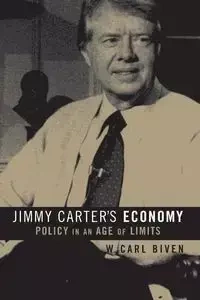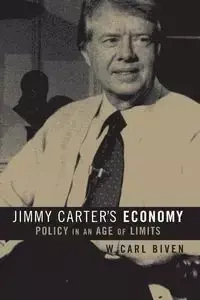Jimmy Carter's Economy - Carl Biven W.
Jimmy Carter's Economy - Carl Biven W.
- Policy in an Age of Limits
AutorzyCarl Biven W.
Jimmy Carter inherited a deeply troubled economy. Inflation had been on the rise since the Johnson years, and the oil crisis Carter faced was the second oil price shock of the decade. In addition, a decline in worker productivity and a rise in competition from Germany and Japan compounded the nation's economic problems. The resulting anti-inflation policy that was forced on Carter included controlling public spending, limiting the expansion of the welfare state, and postponing popular tax cuts. Moreover, according to Biven, Carter argued that the ambitious policies of the Great Society were no longer possible in an age of limits and that the Democratic Party must by economic necessity become more centrist.
EAN: 9781469614557
Symbol
522FAJ03527KS
Rok wydania
2014
Elementy
368
Oprawa
Miekka
Format
15.6x23.4cm
Język
angielski
Strony
368

Bez ryzyka
14 dni na łatwy zwrot

Szeroki asortyment
ponad milion pozycji

Niskie ceny i rabaty
nawet do 50% każdego dnia
Niepotwierdzona zakupem
Ocena: /5
Symbol
522FAJ03527KS
Kod producenta
9781469614557
Rok wydania
2014
Elementy
368
Oprawa
Miekka
Format
15.6x23.4cm
Język
angielski
Strony
368
Autorzy
Carl Biven W.

The massive inflation and oil crisis of the 1970s damaged Jimmy Carter's presidency. In Jimmy Carter's Economy, Carl Biven traces how the Carter administration developed and implemented economic policy amid multiple crises and explores how a combination of factors beyond the administration's control came to dictate a new paradigm of Democratic Party politics.
Jimmy Carter inherited a deeply troubled economy. Inflation had been on the rise since the Johnson years, and the oil crisis Carter faced was the second oil price shock of the decade. In addition, a decline in worker productivity and a rise in competition from Germany and Japan compounded the nation's economic problems. The resulting anti-inflation policy that was forced on Carter included controlling public spending, limiting the expansion of the welfare state, and postponing popular tax cuts. Moreover, according to Biven, Carter argued that the ambitious policies of the Great Society were no longer possible in an age of limits and that the Democratic Party must by economic necessity become more centrist.
EAN: 9781469614557
Jimmy Carter inherited a deeply troubled economy. Inflation had been on the rise since the Johnson years, and the oil crisis Carter faced was the second oil price shock of the decade. In addition, a decline in worker productivity and a rise in competition from Germany and Japan compounded the nation's economic problems. The resulting anti-inflation policy that was forced on Carter included controlling public spending, limiting the expansion of the welfare state, and postponing popular tax cuts. Moreover, according to Biven, Carter argued that the ambitious policies of the Great Society were no longer possible in an age of limits and that the Democratic Party must by economic necessity become more centrist.
EAN: 9781469614557
Niepotwierdzona zakupem
Ocena: /5
Zapytaj o produkt
Niepotwierdzona zakupem
Ocena: /5
Napisz swoją opinię

